Analysis of Prosecutors' Power within the US Criminal Justice System
VerifiedAdded on 2022/08/16
|6
|1542
|16
Essay
AI Summary
This essay examines the significant power held by prosecutors within the US criminal justice system, arguing they are the most influential figures due to their control over charging decisions, plea bargaining, and the overall trajectory of cases. It contrasts this power with that of police officers, highlighting the prosecutor's role in determining guilt and sentencing. The essay also addresses the issue of wrongful convictions, attributing them to factors like eyewitness misidentification, prosecutorial errors, and unreliable forensic science. Furthermore, the essay analyzes plea bargaining through the lens of Missouri vs. Fyre and Lee vs. The United States cases, illustrating the complexities and potential pitfalls within the plea bargaining process. The paper concludes that while prosecutors hold considerable power, their actions must be carefully scrutinized to ensure justice is served and wrongful convictions are minimized. Desklib provides past papers and solved assignments to help students understand these complex legal topics.
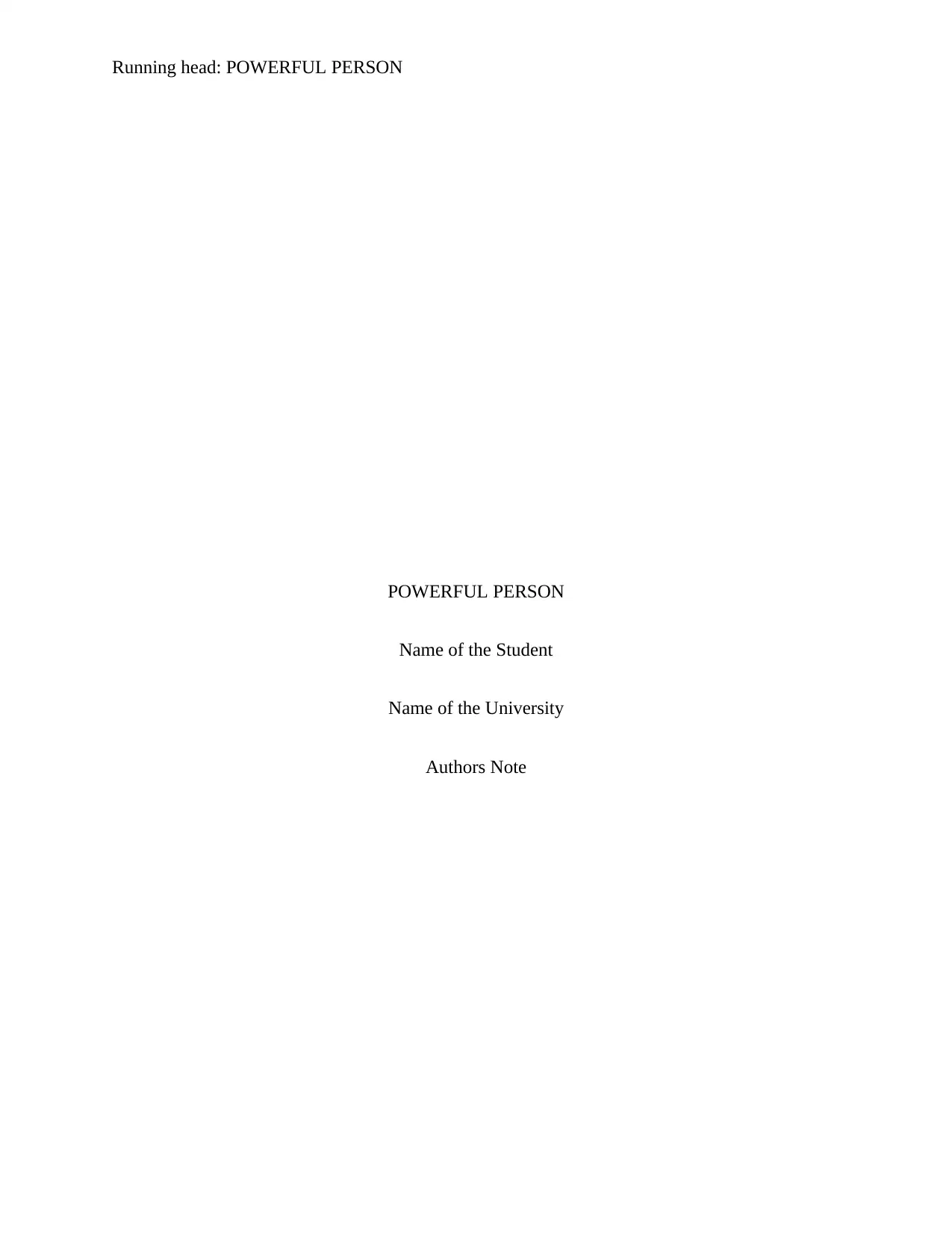
Running head: POWERFUL PERSON
POWERFUL PERSON
Name of the Student
Name of the University
Authors Note
POWERFUL PERSON
Name of the Student
Name of the University
Authors Note
Paraphrase This Document
Need a fresh take? Get an instant paraphrase of this document with our AI Paraphraser
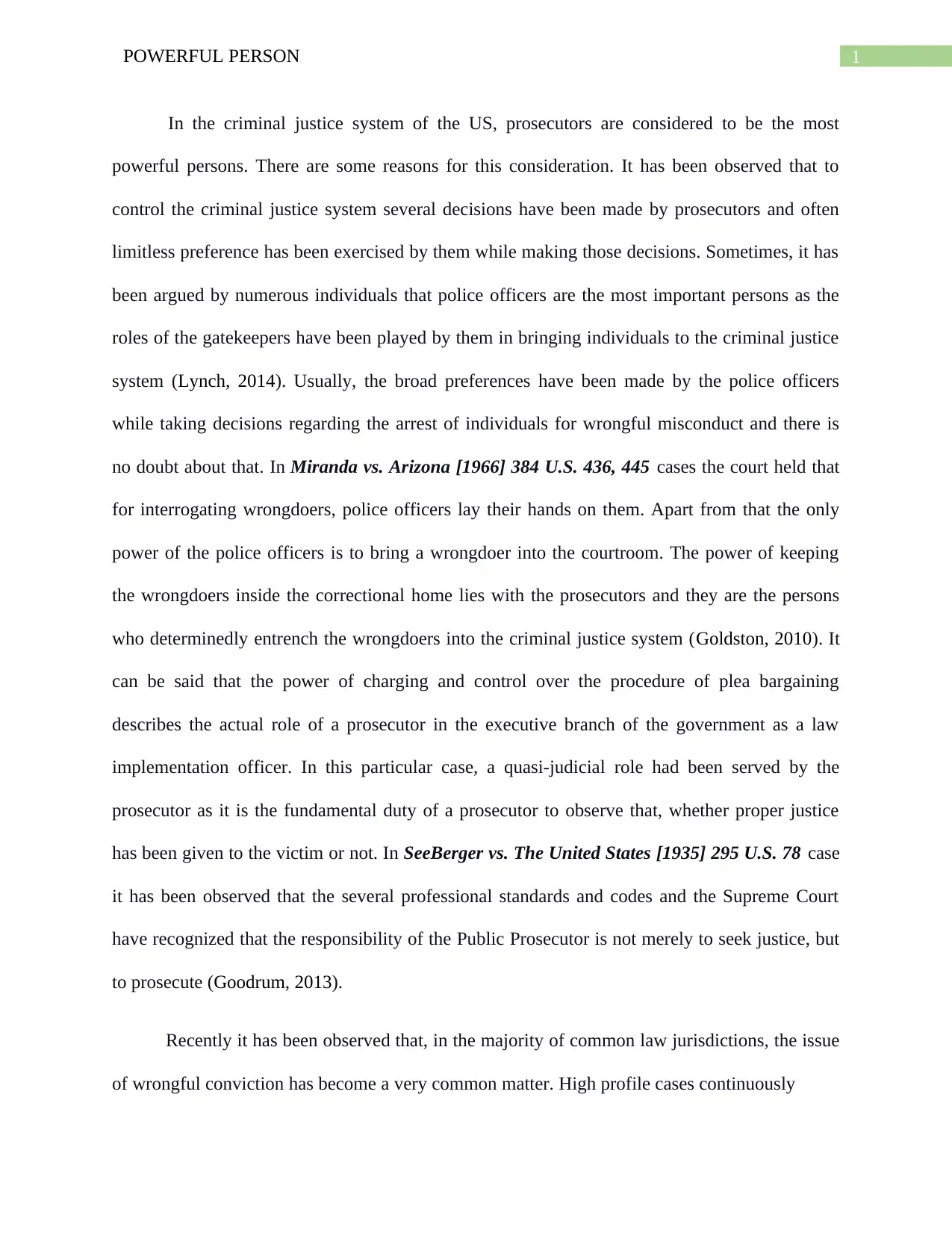
1POWERFUL PERSON
In the criminal justice system of the US, prosecutors are considered to be the most
powerful persons. There are some reasons for this consideration. It has been observed that to
control the criminal justice system several decisions have been made by prosecutors and often
limitless preference has been exercised by them while making those decisions. Sometimes, it has
been argued by numerous individuals that police officers are the most important persons as the
roles of the gatekeepers have been played by them in bringing individuals to the criminal justice
system (Lynch, 2014). Usually, the broad preferences have been made by the police officers
while taking decisions regarding the arrest of individuals for wrongful misconduct and there is
no doubt about that. In Miranda vs. Arizona [1966] 384 U.S. 436, 445 cases the court held that
for interrogating wrongdoers, police officers lay their hands on them. Apart from that the only
power of the police officers is to bring a wrongdoer into the courtroom. The power of keeping
the wrongdoers inside the correctional home lies with the prosecutors and they are the persons
who determinedly entrench the wrongdoers into the criminal justice system (Goldston, 2010). It
can be said that the power of charging and control over the procedure of plea bargaining
describes the actual role of a prosecutor in the executive branch of the government as a law
implementation officer. In this particular case, a quasi-judicial role had been served by the
prosecutor as it is the fundamental duty of a prosecutor to observe that, whether proper justice
has been given to the victim or not. In SeeBerger vs. The United States [1935] 295 U.S. 78 case
it has been observed that the several professional standards and codes and the Supreme Court
have recognized that the responsibility of the Public Prosecutor is not merely to seek justice, but
to prosecute (Goodrum, 2013).
Recently it has been observed that, in the majority of common law jurisdictions, the issue
of wrongful conviction has become a very common matter. High profile cases continuously
In the criminal justice system of the US, prosecutors are considered to be the most
powerful persons. There are some reasons for this consideration. It has been observed that to
control the criminal justice system several decisions have been made by prosecutors and often
limitless preference has been exercised by them while making those decisions. Sometimes, it has
been argued by numerous individuals that police officers are the most important persons as the
roles of the gatekeepers have been played by them in bringing individuals to the criminal justice
system (Lynch, 2014). Usually, the broad preferences have been made by the police officers
while taking decisions regarding the arrest of individuals for wrongful misconduct and there is
no doubt about that. In Miranda vs. Arizona [1966] 384 U.S. 436, 445 cases the court held that
for interrogating wrongdoers, police officers lay their hands on them. Apart from that the only
power of the police officers is to bring a wrongdoer into the courtroom. The power of keeping
the wrongdoers inside the correctional home lies with the prosecutors and they are the persons
who determinedly entrench the wrongdoers into the criminal justice system (Goldston, 2010). It
can be said that the power of charging and control over the procedure of plea bargaining
describes the actual role of a prosecutor in the executive branch of the government as a law
implementation officer. In this particular case, a quasi-judicial role had been served by the
prosecutor as it is the fundamental duty of a prosecutor to observe that, whether proper justice
has been given to the victim or not. In SeeBerger vs. The United States [1935] 295 U.S. 78 case
it has been observed that the several professional standards and codes and the Supreme Court
have recognized that the responsibility of the Public Prosecutor is not merely to seek justice, but
to prosecute (Goodrum, 2013).
Recently it has been observed that, in the majority of common law jurisdictions, the issue
of wrongful conviction has become a very common matter. High profile cases continuously
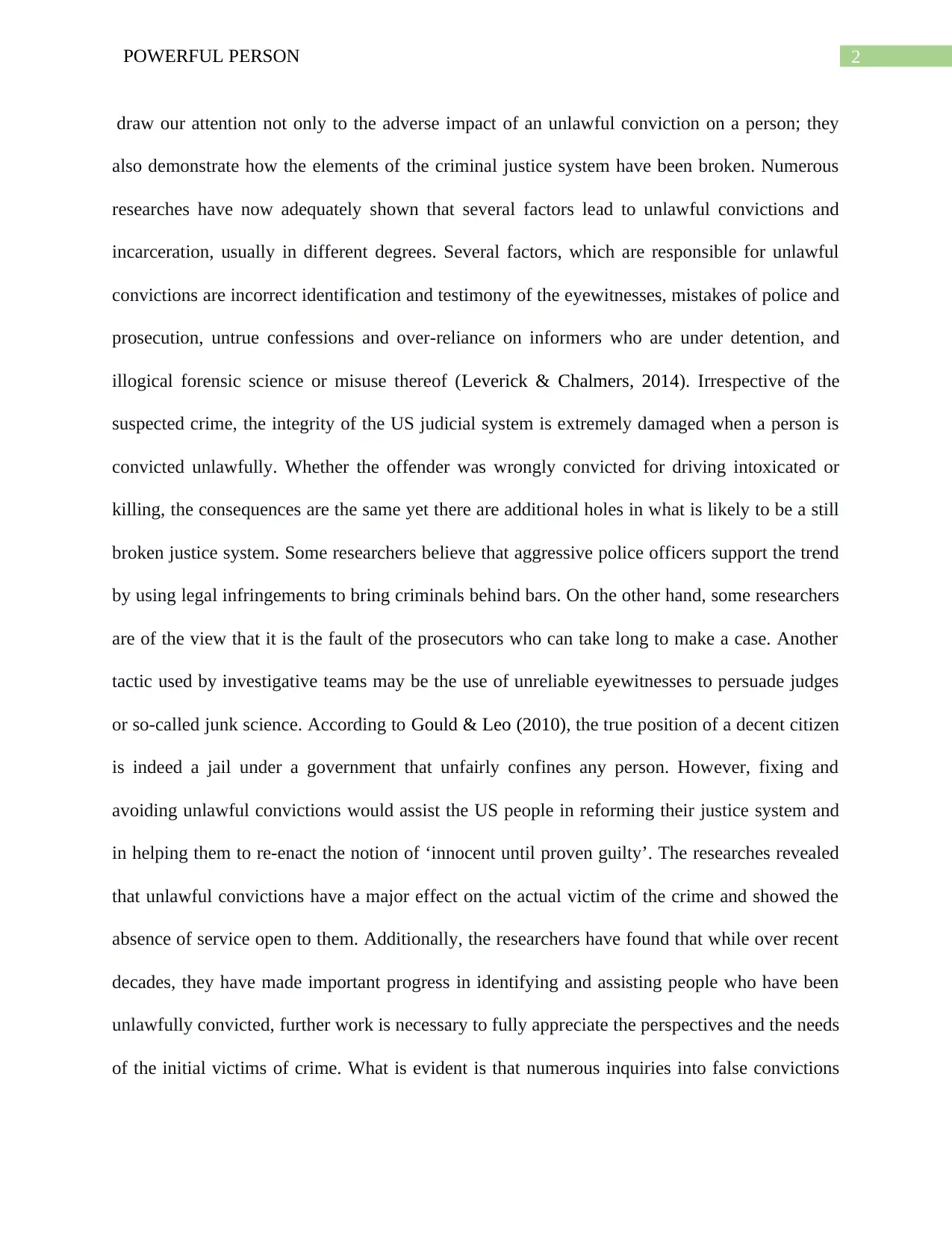
2POWERFUL PERSON
draw our attention not only to the adverse impact of an unlawful conviction on a person; they
also demonstrate how the elements of the criminal justice system have been broken. Numerous
researches have now adequately shown that several factors lead to unlawful convictions and
incarceration, usually in different degrees. Several factors, which are responsible for unlawful
convictions are incorrect identification and testimony of the eyewitnesses, mistakes of police and
prosecution, untrue confessions and over-reliance on informers who are under detention, and
illogical forensic science or misuse thereof (Leverick & Chalmers, 2014). Irrespective of the
suspected crime, the integrity of the US judicial system is extremely damaged when a person is
convicted unlawfully. Whether the offender was wrongly convicted for driving intoxicated or
killing, the consequences are the same yet there are additional holes in what is likely to be a still
broken justice system. Some researchers believe that aggressive police officers support the trend
by using legal infringements to bring criminals behind bars. On the other hand, some researchers
are of the view that it is the fault of the prosecutors who can take long to make a case. Another
tactic used by investigative teams may be the use of unreliable eyewitnesses to persuade judges
or so-called junk science. According to Gould & Leo (2010), the true position of a decent citizen
is indeed a jail under a government that unfairly confines any person. However, fixing and
avoiding unlawful convictions would assist the US people in reforming their justice system and
in helping them to re-enact the notion of ‘innocent until proven guilty’. The researches revealed
that unlawful convictions have a major effect on the actual victim of the crime and showed the
absence of service open to them. Additionally, the researchers have found that while over recent
decades, they have made important progress in identifying and assisting people who have been
unlawfully convicted, further work is necessary to fully appreciate the perspectives and the needs
of the initial victims of crime. What is evident is that numerous inquiries into false convictions
draw our attention not only to the adverse impact of an unlawful conviction on a person; they
also demonstrate how the elements of the criminal justice system have been broken. Numerous
researches have now adequately shown that several factors lead to unlawful convictions and
incarceration, usually in different degrees. Several factors, which are responsible for unlawful
convictions are incorrect identification and testimony of the eyewitnesses, mistakes of police and
prosecution, untrue confessions and over-reliance on informers who are under detention, and
illogical forensic science or misuse thereof (Leverick & Chalmers, 2014). Irrespective of the
suspected crime, the integrity of the US judicial system is extremely damaged when a person is
convicted unlawfully. Whether the offender was wrongly convicted for driving intoxicated or
killing, the consequences are the same yet there are additional holes in what is likely to be a still
broken justice system. Some researchers believe that aggressive police officers support the trend
by using legal infringements to bring criminals behind bars. On the other hand, some researchers
are of the view that it is the fault of the prosecutors who can take long to make a case. Another
tactic used by investigative teams may be the use of unreliable eyewitnesses to persuade judges
or so-called junk science. According to Gould & Leo (2010), the true position of a decent citizen
is indeed a jail under a government that unfairly confines any person. However, fixing and
avoiding unlawful convictions would assist the US people in reforming their justice system and
in helping them to re-enact the notion of ‘innocent until proven guilty’. The researches revealed
that unlawful convictions have a major effect on the actual victim of the crime and showed the
absence of service open to them. Additionally, the researchers have found that while over recent
decades, they have made important progress in identifying and assisting people who have been
unlawfully convicted, further work is necessary to fully appreciate the perspectives and the needs
of the initial victims of crime. What is evident is that numerous inquiries into false convictions
⊘ This is a preview!⊘
Do you want full access?
Subscribe today to unlock all pages.

Trusted by 1+ million students worldwide
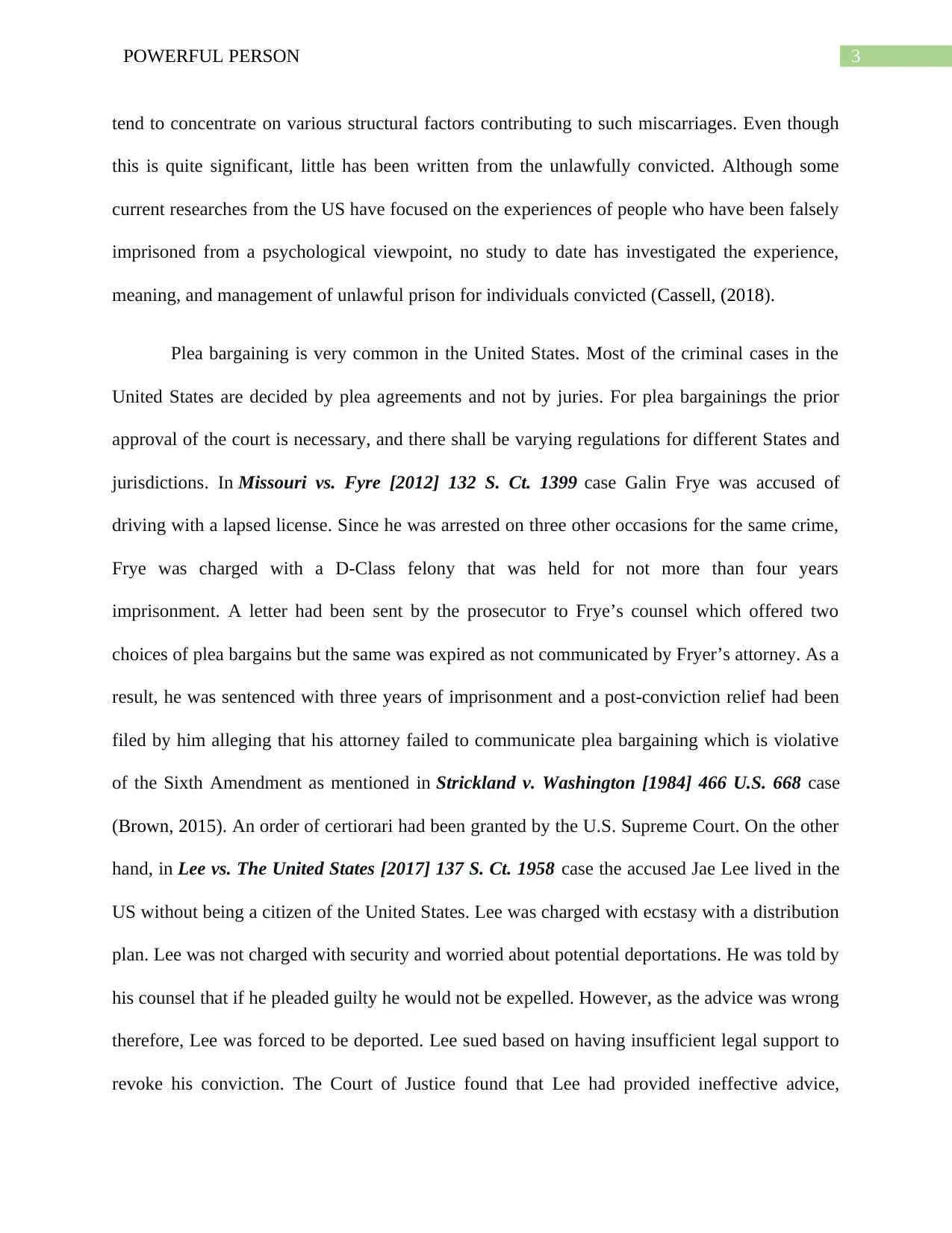
3POWERFUL PERSON
tend to concentrate on various structural factors contributing to such miscarriages. Even though
this is quite significant, little has been written from the unlawfully convicted. Although some
current researches from the US have focused on the experiences of people who have been falsely
imprisoned from a psychological viewpoint, no study to date has investigated the experience,
meaning, and management of unlawful prison for individuals convicted (Cassell, (2018).
Plea bargaining is very common in the United States. Most of the criminal cases in the
United States are decided by plea agreements and not by juries. For plea bargainings the prior
approval of the court is necessary, and there shall be varying regulations for different States and
jurisdictions. In Missouri vs. Fyre [2012] 132 S. Ct. 1399 case Galin Frye was accused of
driving with a lapsed license. Since he was arrested on three other occasions for the same crime,
Frye was charged with a D-Class felony that was held for not more than four years
imprisonment. A letter had been sent by the prosecutor to Frye’s counsel which offered two
choices of plea bargains but the same was expired as not communicated by Fryer’s attorney. As a
result, he was sentenced with three years of imprisonment and a post-conviction relief had been
filed by him alleging that his attorney failed to communicate plea bargaining which is violative
of the Sixth Amendment as mentioned in Strickland v. Washington [1984] 466 U.S. 668 case
(Brown, 2015). An order of certiorari had been granted by the U.S. Supreme Court. On the other
hand, in Lee vs. The United States [2017] 137 S. Ct. 1958 case the accused Jae Lee lived in the
US without being a citizen of the United States. Lee was charged with ecstasy with a distribution
plan. Lee was not charged with security and worried about potential deportations. He was told by
his counsel that if he pleaded guilty he would not be expelled. However, as the advice was wrong
therefore, Lee was forced to be deported. Lee sued based on having insufficient legal support to
revoke his conviction. The Court of Justice found that Lee had provided ineffective advice,
tend to concentrate on various structural factors contributing to such miscarriages. Even though
this is quite significant, little has been written from the unlawfully convicted. Although some
current researches from the US have focused on the experiences of people who have been falsely
imprisoned from a psychological viewpoint, no study to date has investigated the experience,
meaning, and management of unlawful prison for individuals convicted (Cassell, (2018).
Plea bargaining is very common in the United States. Most of the criminal cases in the
United States are decided by plea agreements and not by juries. For plea bargainings the prior
approval of the court is necessary, and there shall be varying regulations for different States and
jurisdictions. In Missouri vs. Fyre [2012] 132 S. Ct. 1399 case Galin Frye was accused of
driving with a lapsed license. Since he was arrested on three other occasions for the same crime,
Frye was charged with a D-Class felony that was held for not more than four years
imprisonment. A letter had been sent by the prosecutor to Frye’s counsel which offered two
choices of plea bargains but the same was expired as not communicated by Fryer’s attorney. As a
result, he was sentenced with three years of imprisonment and a post-conviction relief had been
filed by him alleging that his attorney failed to communicate plea bargaining which is violative
of the Sixth Amendment as mentioned in Strickland v. Washington [1984] 466 U.S. 668 case
(Brown, 2015). An order of certiorari had been granted by the U.S. Supreme Court. On the other
hand, in Lee vs. The United States [2017] 137 S. Ct. 1958 case the accused Jae Lee lived in the
US without being a citizen of the United States. Lee was charged with ecstasy with a distribution
plan. Lee was not charged with security and worried about potential deportations. He was told by
his counsel that if he pleaded guilty he would not be expelled. However, as the advice was wrong
therefore, Lee was forced to be deported. Lee sued based on having insufficient legal support to
revoke his conviction. The Court of Justice found that Lee had provided ineffective advice,
Paraphrase This Document
Need a fresh take? Get an instant paraphrase of this document with our AI Paraphraser
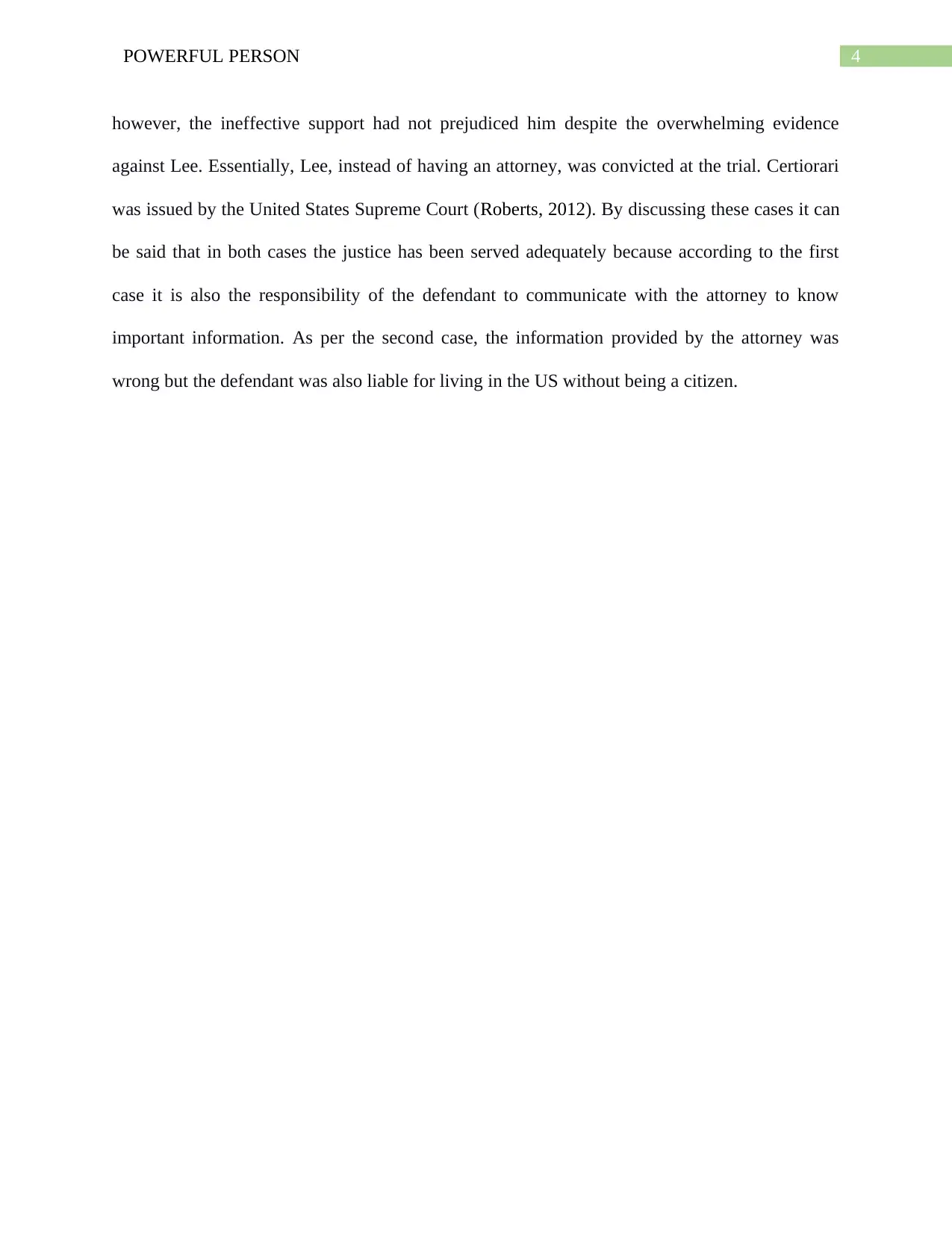
4POWERFUL PERSON
however, the ineffective support had not prejudiced him despite the overwhelming evidence
against Lee. Essentially, Lee, instead of having an attorney, was convicted at the trial. Certiorari
was issued by the United States Supreme Court (Roberts, 2012). By discussing these cases it can
be said that in both cases the justice has been served adequately because according to the first
case it is also the responsibility of the defendant to communicate with the attorney to know
important information. As per the second case, the information provided by the attorney was
wrong but the defendant was also liable for living in the US without being a citizen.
however, the ineffective support had not prejudiced him despite the overwhelming evidence
against Lee. Essentially, Lee, instead of having an attorney, was convicted at the trial. Certiorari
was issued by the United States Supreme Court (Roberts, 2012). By discussing these cases it can
be said that in both cases the justice has been served adequately because according to the first
case it is also the responsibility of the defendant to communicate with the attorney to know
important information. As per the second case, the information provided by the attorney was
wrong but the defendant was also liable for living in the US without being a citizen.
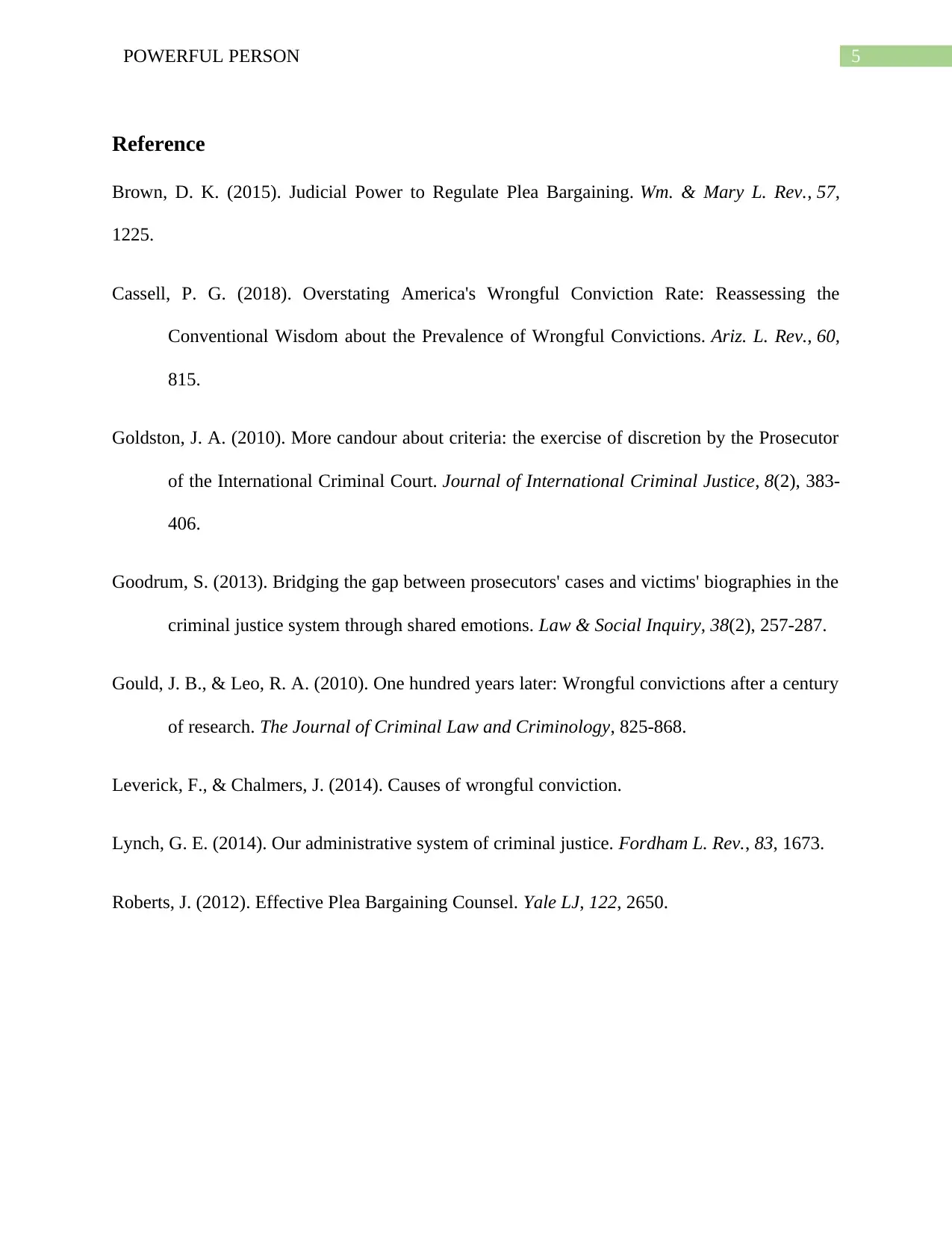
5POWERFUL PERSON
Reference
Brown, D. K. (2015). Judicial Power to Regulate Plea Bargaining. Wm. & Mary L. Rev., 57,
1225.
Cassell, P. G. (2018). Overstating America's Wrongful Conviction Rate: Reassessing the
Conventional Wisdom about the Prevalence of Wrongful Convictions. Ariz. L. Rev., 60,
815.
Goldston, J. A. (2010). More candour about criteria: the exercise of discretion by the Prosecutor
of the International Criminal Court. Journal of International Criminal Justice, 8(2), 383-
406.
Goodrum, S. (2013). Bridging the gap between prosecutors' cases and victims' biographies in the
criminal justice system through shared emotions. Law & Social Inquiry, 38(2), 257-287.
Gould, J. B., & Leo, R. A. (2010). One hundred years later: Wrongful convictions after a century
of research. The Journal of Criminal Law and Criminology, 825-868.
Leverick, F., & Chalmers, J. (2014). Causes of wrongful conviction.
Lynch, G. E. (2014). Our administrative system of criminal justice. Fordham L. Rev., 83, 1673.
Roberts, J. (2012). Effective Plea Bargaining Counsel. Yale LJ, 122, 2650.
Reference
Brown, D. K. (2015). Judicial Power to Regulate Plea Bargaining. Wm. & Mary L. Rev., 57,
1225.
Cassell, P. G. (2018). Overstating America's Wrongful Conviction Rate: Reassessing the
Conventional Wisdom about the Prevalence of Wrongful Convictions. Ariz. L. Rev., 60,
815.
Goldston, J. A. (2010). More candour about criteria: the exercise of discretion by the Prosecutor
of the International Criminal Court. Journal of International Criminal Justice, 8(2), 383-
406.
Goodrum, S. (2013). Bridging the gap between prosecutors' cases and victims' biographies in the
criminal justice system through shared emotions. Law & Social Inquiry, 38(2), 257-287.
Gould, J. B., & Leo, R. A. (2010). One hundred years later: Wrongful convictions after a century
of research. The Journal of Criminal Law and Criminology, 825-868.
Leverick, F., & Chalmers, J. (2014). Causes of wrongful conviction.
Lynch, G. E. (2014). Our administrative system of criminal justice. Fordham L. Rev., 83, 1673.
Roberts, J. (2012). Effective Plea Bargaining Counsel. Yale LJ, 122, 2650.
⊘ This is a preview!⊘
Do you want full access?
Subscribe today to unlock all pages.

Trusted by 1+ million students worldwide
1 out of 6
Related Documents
Your All-in-One AI-Powered Toolkit for Academic Success.
+13062052269
info@desklib.com
Available 24*7 on WhatsApp / Email
![[object Object]](/_next/static/media/star-bottom.7253800d.svg)
Unlock your academic potential
Copyright © 2020–2026 A2Z Services. All Rights Reserved. Developed and managed by ZUCOL.





